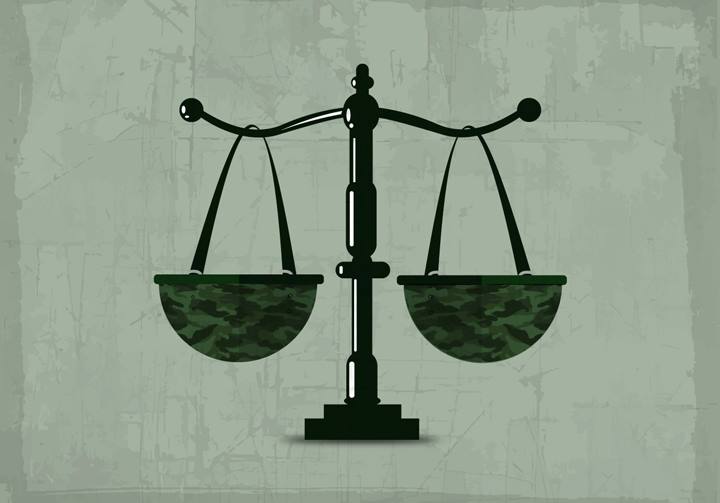ISLAMABAD:
Supreme Court Justices Jamal Khan Mandokhail and Naeem Akhtar Afghan on Friday released a dissenting opinion in the case concerning the trial of civilians in military courts, declaring such court-martials unconstitutional.
The 35-page minority decision firmly states that the jurisdiction of court-martials was exclusively limited to military personnel and cannot be extended to ordinary civilians.
The judges ruled that the application of military jurisdiction to civilians was unconstitutional.
The dissenting note critically examines the broader assumption that civil courts are incapable of dealing with high-profile terrorism cases, suggesting instead that this narrative was misleading.
It observes that it has generally been portrayed that civil courts have failed to handle grave offences such as terrorism, and that military courts are the only remedy, but the reality is quite the opposite.
Recalling past precedent, the judges noted that military courts were temporarily authorised in 2015 to hear certain terrorism-related cases. However, the experiment failed to eliminate terrorism, partly because military officers lack the judicial experience required to adjudicate complex criminal matters.
The decision observes that globally, terrorism cases are not tried in military courts. It argues that criticism of the criminal justice system is misplaced and notes that acquittals in civil courts often result from poor investigation, weak witnesses, or politically charged cases, not from judicial incompetence.
It pointed out that according to Article 25 of the Constitution, all citizens are equal before the law and are entitled to equal protection of the law. The principle of equal protection ensures that all citizens are treated alike under the law, irrespective of their background, race, religion, political affiliation, action or other classifications.
“This is a fundamental right guaranteed by the Constitution, ensuring that the law applies equally and no one is above the law. Treating citizens differently, without a reasonable classification amount to discrimination.”
“This happens when two equally placed persons or groups of people are treated differently. Discriminating individuals in legal proceedings on account of their acts or nature of an offence, is a violation of the principle of equal before law and are entitled to equal protection of law,” it further noted.
“The security of life and liberty of a person is a fundamental right, to be free from arbitrary deprivation of life and liberty. Article 9 of the Constitution guarantees and ensures that citizens have the right for protection from harm, physical danger, potential risks and threats to their life, unjust or illegal detention or imprisonment and of any action that could take away their freedom or life, in all circumstances,” the dissenting note read.
It further observed that an independent judiciary can act as a check on the government’s power to ensure the security of life and liberty of citizens. The criminal justice system entails a set of laws and principles that provide a procedure, aim to protect lthe ife and liberty of citizens, and to ensure order in society.
Article 10 of the Constitution ensures safeguards as to the arrest and detention of a person, with a right to consult and be defended by a legal practitioner of his own choice. It is also made sure that no person shall be detained in custody beyond a period of twenty-four hours without the authority of a magistrate.
“The courts martial established under the MJS, consisting of executive, are not independent and impartial. They do not provide the constitutional protection of security of life and liberty of a person, and safeguard as to his arrest and detention. While detained in military custody, the provisions of jail manual are not applicable to the persons accused of military crime. Courts’ martial proceedings are in-camera.”
It further noted that the right of the accused to consult and be defended by a legal practitioner of his own choice, guaranteed by the Constitution, was subject to the approval of the Chief of the Army Staff or the convening officer, as provided by rule 82 of the Pakistan Army Act, Rules 1954.
“This is a fundamental right of a person under sub-Article (1) of Article 10 of the Constitution, which cannot be made conditional. The custody of accused of offence under clause (d) and the procedure adopted by the courts martial are inconsistent with, takes away and abridge their fundamental rights, which is violative of Articles 9 and 10 of the Constitution.”
The note stated that the right to fair trial and due process is universally accepted as a fundamental right, therefore, the legislature, realising its importance and necessity, inserted Article 10A in Chapter 1 of Part II of the Constitution, by the Constitution (Eighteenth Amendment) Act, 2010.
“Fair trial and due process help limiting abuse by Governments and State authorities and ensure integrity and fairness of the legal system. Due process has a requirement that the legal matter pertaining to civil rights and obligations and a criminal charge against a citizen be resolved according to law, established rules and principles, on the basis of evidence presented.”
The dissent also criticises both the federal and provincial governments, stating that instead of investing in and improving the civil justice system, they opted for court-martials of civilians, a move that exceeds constitutional boundaries.
The judges observed that the punishments handed down to civilians involved in the May 9, 2023, events by military courts were beyond their jurisdiction and therefore null and void.
The note concludes by reiterating that the delivery of justice falls within the constitutional domain of the civilian judiciary.
The rule of law demands that every citizen be afforded the right to a fair trial, the decision states.

